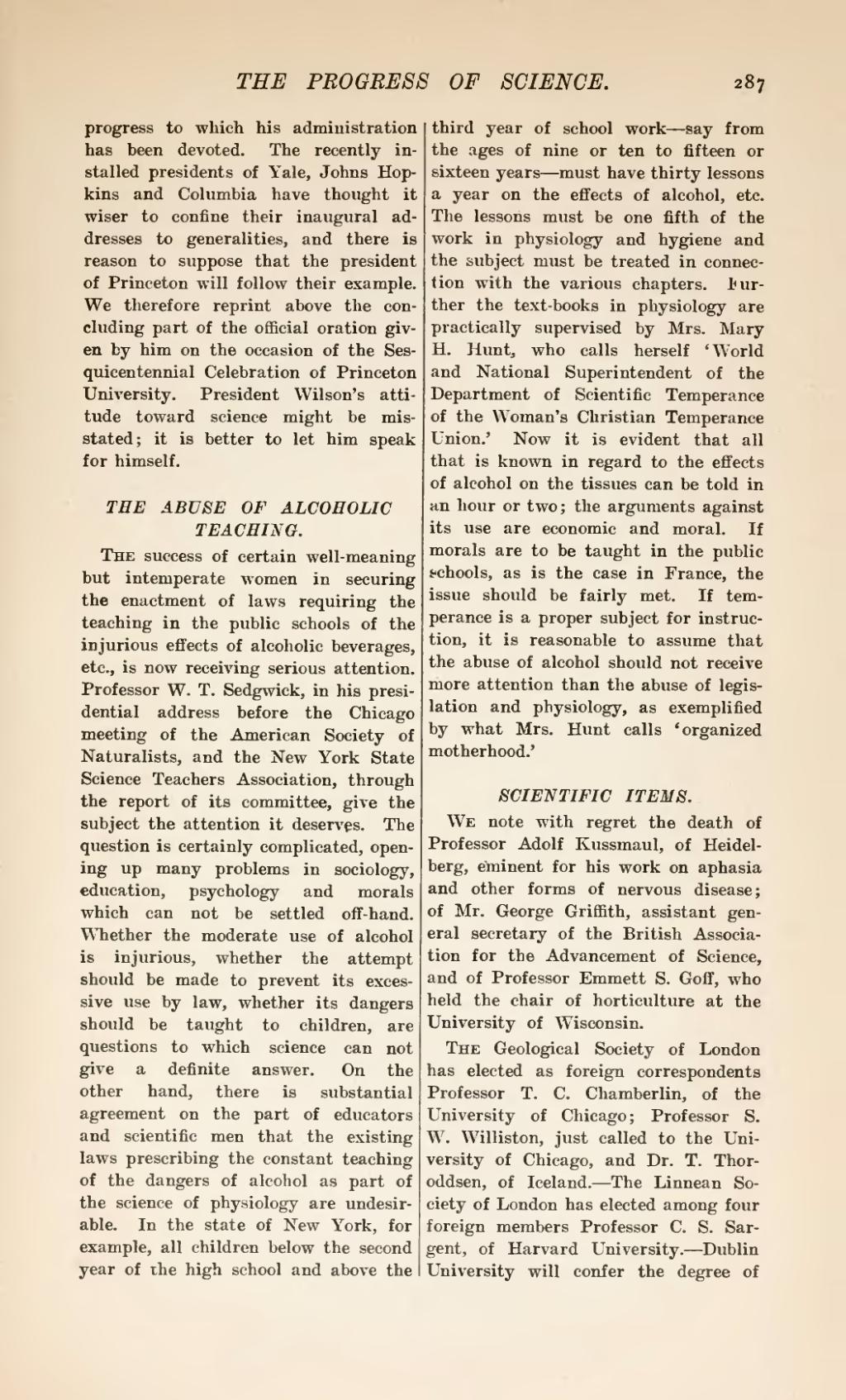progress to which his administration has been devoted. The recently installed presidents of Yale, Johns Hopkins and Columbia have thought it wiser to confine their inaugural addresses to generalities, and there is reason to suppose that the president of Princeton will follow their example. We therefore reprint above the concluding part of the official oration given by him on the occasion of the Sesquicentennial Celebration of Princeton University. President Wilson's attitude toward science might be misstated; it is better to let him speak for himself.
THE ABUSE OF ALCOHOLIC TEACHING.
The success of certain well-meaning but intemperate women in securing the enactment of laws requiring the teaching in the public schools of the injurious effects of alcoholic beverages, etc., is now receiving serious attention. Professor W. T. Sedgwick, in his presidential address before the Chicago meeting of the American Society of Naturalists, and the New York State Science Teachers Association, through the report of its committee, give the subject the attention it deserves. The question is certainly complicated, opening up many problems in sociology, education, psychology and morals which can not be settled off-hand. Whether the moderate use of alcohol is injurious, whether the attempt should be made to prevent its excessive use by law, whether its dangers should be taught to children, are questions to which science can not give a definite answer. On the other hand, there is substantial agreement on the part of educators and scientific men that the existing laws prescribing the constant teaching of the dangers of alcohol as part of the science of physiology are undesirable. In the state of New York, for example, all children below the second year of the high school and above the third year of school work—say from the ages of nine or ten to fifteen or sixteen years—must have thirty lessons a year on the effects of alcohol, etc. The lessons must be one fifth of the work in physiology and hygiene and the subject must be treated in connection with the various chapters, further the text-books in physiology are practically supervised by Mrs. Mary H. Hunt, who calls herself 'World and National Superintendent of the Department of Scientific Temperance of the Woman's Christian Temperance Union.' Now it is evident that all that is known in regard to the effects of alcohol on the tissues can be told in an hour or two; the arguments against its use are economic and moral. If morals are to be taught in the public schools, as is the case in France, the issue should be fairly met. If temperance is a proper subject for instruction, it is reasonable to assume that the abuse of alcohol should not receive more attention than the abuse of legislation and physiology, as exemplified by what Mrs. Hunt calls 'organized motherhood.'
SCIENTIFIC ITEMS.
We note with regret the death of Professor Adolf Kussmaul, of Heidelberg, eminent for his work on aphasia and other forms of nervous disease; of Mr. George Griffith, assistant general secretary of the British Association for the Advancement of Science, and of Professor Emmett S. Goff, who held the chair of horticulture at the University of Wisconsin.
The Geological Society of London has elected as foreign correspondents Professor T. C. Chamberlin, of the University of Chicago; Professor S. W. Williston, just called to the University of Chicago, and Dr. T. Thoroddsen, of Iceland.—The Linnean Society of London has elected among four foreign members Professor C. S. Sargent, of Harvard University.—Dublin University will confer the degree of
